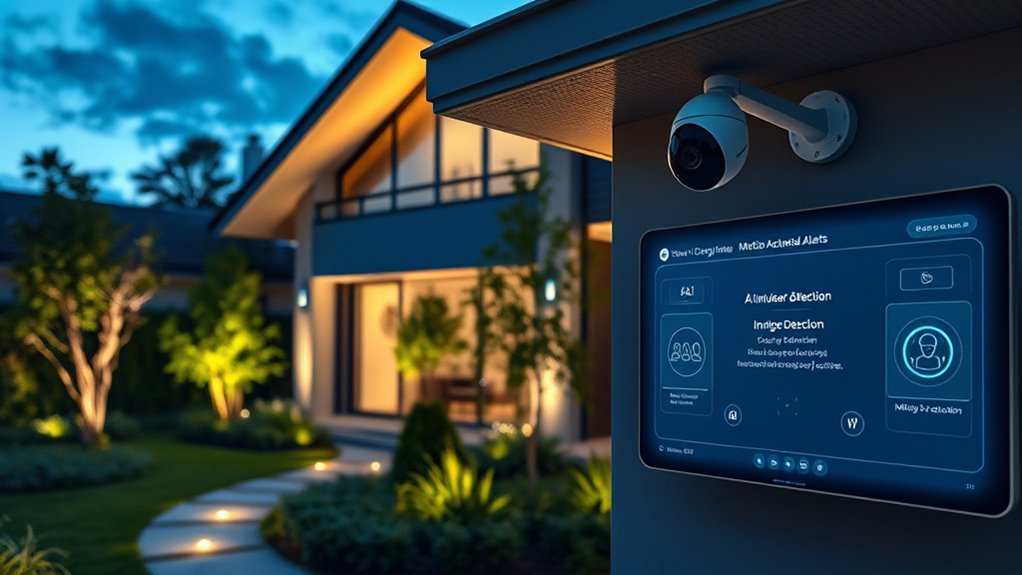Using AI-powered security systems for your home, you benefit from real-time analysis of threats through facial recognition and intrusion detection. These systems actively identify familiar faces, detect suspicious activity, and respond instantly by activating deterrents or alerting you on your devices. They adapt over time to minimize false alarms, ensuring reliable and proactive protection. If you’re curious about how these intelligent features can keep your home safer, there’s more to discover about their powerful capabilities.
Key Takeaways
- AI security systems utilize facial recognition to identify familiar individuals and detect unfamiliar or suspicious faces for alerting.
- Real-time intrusion detection analyzes movement patterns, enabling immediate threat assessment and automatic deterrence measures.
- Integration with smart home devices allows coordinated responses, like locking doors or activating lights, for enhanced protection.
- Adaptive learning enables the system to recognize routine activities, reduce false alarms, and improve detection accuracy over time.
- AI-powered security offers proactive threat identification, quick responses, and continuous system improvements for comprehensive home protection.

Are you searching for more intelligent methods to safeguard your residence? AI-powered security systems are transforming home safety, offering advanced features like facial recognition and intrusion detection that considerably enhance your security. These systems don’t just monitor; they actively analyze and respond to potential threats, providing you with peace of mind. With facial recognition technology, your security system can differentiate between familiar faces—family members, friends—and unfamiliar or suspicious individuals. When someone approaches your front door, the system scans their face and compares it against a database. If the person is recognized, the system can disarm the alarm or notify you that a loved one has arrived. If not, it can automatically trigger an alert or start recording for later review. This precise identification minimizes false alarms and guarantees that your security measures target authentic threats.
AI security systems use facial recognition to identify familiar faces and detect threats, enhancing home safety proactively.
Intrusion detection is at the heart of these systems, and AI improves its accuracy and speed. Traditional security setups depend on simple sensors or cameras that alert you after an intrusion has taken place. AI-driven systems, however, analyze movement patterns and behaviors in real time, distinguishing between harmless activities—like a neighbor walking by—and actual dangers. When the system detects unusual activity near your property, it can immediately notify you via your smartphone and even activate deterrence measures, such as flashing lights or sirens. This quick response ability acts as a proactive barrier against break-ins or vandalism. Moreover, AI-powered cameras can differentiate between animals, humans, and objects, reducing false alarms caused by pets or environmental factors. This intelligent detection ensures you’re only alerted to genuine incidents, saving you from unnecessary stress and false security calls.
Another benefit of AI-enabled security systems is their capacity to learn and adjust. Over time, they analyze patterns—like when you typically arrive home or leave—and modify their sensitivity accordingly. This results in fewer false alarms during routine activities and increased vigilance during unusual events. Additionally, integrating AI with other smart home devices creates a unified security network. For instance, if your facial recognition system detects an unfamiliar face, it can trigger your smart locks to secure doors, turn on outdoor lights, or notify your security provider. All these features work together smoothly, giving you a full and intuitive home protection system.
In essence, AI-powered security systems utilize facial recognition and intrusion detection to establish a safer, smarter home environment. They proactively identify threats, respond promptly to suspicious activities, and continually evolve to improve their precision. With these advanced functions, you can rest easy knowing your home is safeguarded by cutting-edge technology, prioritizing your safety with less effort on your part.
Frequently Asked Questions
How Do AI Security Systems Handle False Alarms?
AI security systems handle false alarms by leveraging advanced sensor accuracy and false alarm reduction techniques. When a potential threat is detected, the system analyzes data from multiple sensors to confirm if it’s a real issue, reducing unnecessary alerts. If the system detects a false alarm, it learns from this, improving its accuracy over time. This proactive approach keeps your home safer while minimizing disruptions caused by false alarms.
Can AI Security Systems Integrate With Existing Home Devices?
Yes, AI security systems can integrate with existing home devices. They offer smart device compatibility, allowing seamless connection with your smart lights, locks, and thermostats. However, you might face installation challenges if your devices use different protocols or outdated technology. To guarantee smooth integration, check compatibility beforehand and consider professional setup if needed. This way, your home becomes a cohesive, smarter security environment.
What Are the Privacy Implications of AI Security Cameras?
You should be aware that AI security cameras raise privacy concerns, especially regarding data security. These cameras constantly monitor your home, which means sensitive footage could be accessed or misused if not properly protected. To safeguard your privacy, verify the system uses strong encryption, limits data sharing, and provides clear privacy settings. Staying informed about how your data is stored and used helps you maintain control and peace of mind.
How Do AI Systems Learn and Improve Over Time?
Think of AI systems as a sponge soaking up knowledge. They learn and improve through machine learning, analyzing data from your security footage. Adaptive algorithms act like a seasoned detective, adjusting their methods based on new patterns and threats. Over time, this continuous learning makes your home protection smarter and more responsive. You benefit from a system that evolves, staying one step ahead to keep your home safer.
Are AI Security Systems Vulnerable to Hacking?
Yes, AI security systems can be vulnerable to hacking due to cybersecurity threats. Hackers may target these systems to access your private data or disable security features. To protect yourself, guarantee the system uses strong data encryption and updates regularly. You should also use complex passwords and enable multi-factor authentication. Staying vigilant about cybersecurity threats helps minimize risks and keeps your home security system secure.
Conclusion
With AI-powered security systems, you’ll feel safer than ever—like having a team of super-intelligent guards watching your home 24/7. These systems can detect intruders faster than you can blink and respond instantly, making your home virtually impenetrable. Forget traditional alarms—this technology is so advanced, it’s almost like having a fortress guarded by digital superheroes. Invest now, and turn your home into the most secure place on Earth—nothing can break through these high-tech defenses!









